|
<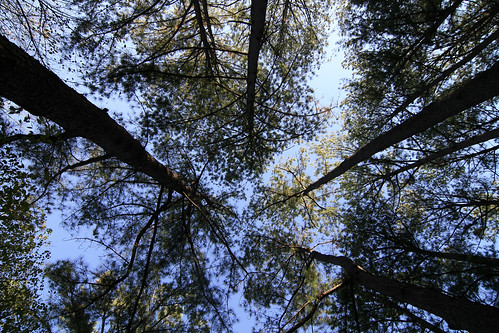
Reaching for the sky.
(*photo credit)
December 1, 2012 Advent: A Season of Hope
I can hardly imagine living without hope. As for the future of the world, there is a colorful spectrum of possibilities, from the worst to the best. What will happen, I do not know. Hope forces me to believe that those better alternatives will prevail, and above all it forces me to do something to make them happen. Vaclav Havel
Hope springs eternal and rightly so. It is in the air we breathe, for without air there is no physical life -- and without hope no spiritual life. While immersed in hope, we seldom think much about its value and necessity. Without hope we are lost in the sea of troubles all around in which we appear helpless. Like survivors riding in a life raft before rescue, we learn to make the best of where we are and how to live with the limitations that surround us. Our ability to continue is our hope; our enthusiasm to continue is the God within to whom we confidently give witness.
Act in hope, and hope others act in a similar fashion. Some who are cynical say we are fooled by expecting others to follow our example -- but these unfortunate souls show their disbelief. If we act hopefully there is an inbuilt magnetism that draws others, even when words fail us or reason sees little sure success ahead. It is not the vain hope of a gambler who places everything in one last bet. Rather, it is the sure belief that promises bathed in love and fulfilled in the past will continue to be before us. Christ came yesterday at that first Advent; Christ comes today into our hearts; Christ will come again as promised.
The world around us needs a heavy dose of hope, something that believers are called to profess. Without hope people lack the alertness to see new possibilities. We can help save a floundering Earth with its changing climate due to human activities. We can challenge these activities and put in their place renewable energy sources (wind alone is known to be a source of 100 times current world energy needs) -- and those following us hopefully can continue the quest for a better life. Improvement does not mean continued destitution on the part of some. We want the privileged to forego their immense wealth for their own betterment.
Hope involves listening to the Spirit in our lives. It is more than insights by technically astute people; it involves breathing in the air of freedom. The hopeless suffocate within the imprisonment of their own mental constructs -- they say it is no use to continue; they see no new vision; they regard growth as impossible. An atmosphere of hopelessness allows no fresh ways of thinking and doing; it leads to paralysis where there is no room for the Spirit. Our hope promises to conquer despair and we must hope that our enthusiasm continues in troubled times.
Prayer: Lord, through your Resurrection we are empowered to hope and to discover that you are in charge of our world. Help us to challenge and conquer despair and to work with you with greater confidence and love for the betterment of all.

A surprise finding in a warm early December.
(*photo credit)
December 2, 2012 Expectancy as an Advent Characteristic
When these things begin to take place, stand erect, hold your heads high, because your liberation is near at hand. (Luke 21:28)
We are entering a season of awaiting the coming of the Lord. In essence, we practice this virtue of expectancy throughout our lives and in a variety of circumstances. A baby awaits the bottle at feeding time; youth listen for the bell that means outdoor exercise or the end of the school day; teens long for the day that they can get a driver's license and be "free" behind the wheel; the pregnant mother counts days before delivery; workers look forward to retirement; and elders start to reflect on what follows mortal life. Life from start to finish involves vigilance, waiting for a more promising event to occur.
Expectancy is at the heart of the Old Testament as all awaited the promised one, "The Lord our justice." The Messiah will bring a new order to a troubled world and all will be able to live in peace. While our reflection on history includes the gradual coming to a better world order, still work is unfinished. Jesus comes as the awaited one and he teaches, heals, suffers, dies, and rises in the course of human history. But this event is part of an unfinished movement of which we are invited to be part. We do not wait passively; we are invited to enter and participate in the flow and even help accelerate the final coming of the Lord in glory.
Expectancy then includes our participation in the fullest sense in the final advent occurrence. This gives a completely different cast to all the series of anticipated events that we have looked forward to in life. The promise is something that is to come in a fashion we may guess, but do not have a definite image of what will transpire. Events are often foretold by homemade prophets and all of these have been proven false over time. We are party to the coming; we are not paralyzed by the fright of the unbeliever. Rather, we stand erect and hold our heads high. Amazingly this is the posture and role of the activist, not one who is unable to move due to fright. In fact, the second reading (I Thessalonians 3:12-4:2) says we are to redouble our efforts -- our improvement in conduct as the end of time draws nearer.
Among the elements that accompany the virtue of expectancy are the following: the ultimate outcome will be successful for God's justice will ultimately reign; if we remain faithful, we will participate in that justice; we can expect the signs that will indicate the final occurrences; we are not to be frightened but continue in the work we are doing in a redoubling of effort; we are to support those who seem paralyzed by what is coming; and we know for sure that time is shortening with each passing day. Some may regard these elements as foolish, but we can look out and see -- and know full well that a failure to perceive signs is really the condition of the foolish. We are all called to be alert.
Prayer: Lord, help us see signs of the time with equanimity.
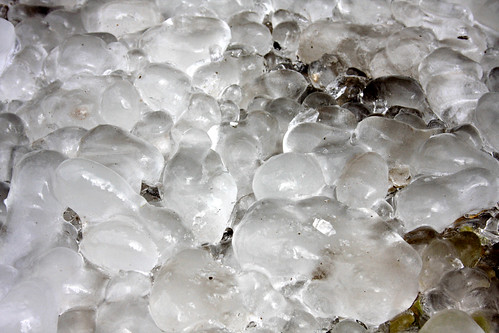
Ripples of ice from melted icicles.
(*photo credit)
December 3, 2012 Don'ts and Dos When Stranded in a Blizzard
The list of things to do depends much on where you are caught in that storm. It is quite different if on a canoe in a yet unfrozen lake, or in a car on a stretch of forsaken highway, or in the confines of your home. I have been stranded a number of times (once for an entire week), and was lucky enough to creep by auto down the Interstate to the Oldenburg, Indiana Franciscans and had enough time to make my retreat during that never to be forgotten storm. Another time the place where I was forced to stop driving was near a motel north of Lafayette, Indiana on the way to a Jesuit meeting in Chicago -- and conditions deteriorated when stranded guests ate up all the snack food in a short while. In both these cases the conditions were temporary. In some home circumstances, utilities have failed, and patience to endure the storm was needed.
Maybe the "don'ts" should precede the "dos":
* Don't leave home (in a car) without taking some essentials -- changes of clothes, sleeping bag, candles, flashlight and batteries, crash blanket, some basic high energy food, matches, battery cables, gloves, boots, ice scraper, and warm cap.
* Don't neglect weather reports. It is not wise to try to outrun a storm; if you know the storm's direction adjust your route accordingly to miss its direct impact.
* Don't forget about neighbors or others caught in the storm; they may be less prepared than you for the consequences.
* Don't strain yourself in too much digging out of the drifts or de-icing the vehicle.
* Don't wander about in the stormy outdoors -- and get lost.
* Don't allow blizzard conditions to overwhelm you.
The "dos" are also important:
* Do keep posted on weather conditions for they can help with change of routes to travel or, for safety sake, to stay put and collect necessary supplies.
* Do keep warm with many layers of clothes to conserve body heat. If space heat goes out in your lodging, use the crash blanket or its equivalent and do not over-exert yourself.
* Do take along reading and study materials and find the light of day an ideal time to do some catching up. If you have things set aside for the snowy day, the frustration of being stranded is highly reduced.
* If you are caught in a storm outdoors, build a protective burrow or shelter and insulate with grass, leaves and any insulating material at hand. Stay put until the storm passes.
* Do consider the storm to be an ideal time to pray, for that can be done in the dark or where reading materials are absent.
Prayer: Lord, winter is before us and we need to be always prepared. Allow us to have an understanding of weather conditions, fortitude to withstand the elements, social justice to look out for those in greater need, and prudence to act properly.

A blooming rose in December. Rockcastle Co., KY.
(*photo credit)
December 4, 2012 The Last Rose of Summer
One early sharp December evening forty years ago I was on my way back to my residence on Capitol Hill in Washington, DC and passed the National Botanical Garden. I was surprised to see that a single flower on a rose bush had survived a deep frost. Granted, today in far warmer times there might be many survivors on that bush -- and they all ought to remain for viewing by passersby. In my sense of compassion I picked that 1972 surviving rose and took it back to my room, and pressed it to include in a Christmas card for my mother who loved roses; a less than perfect act imitating Jacob fooling his father Isaac. Why let a rose die alone?
Why this somewhat sentimental tale? We like to see survivors even when their remaining time is limited. These are the ones who last long beyond their normal time, when others have happily served their duties and passed on. The competitor who goes for the crown when others are left behind receives the applause, even though we are convinced that such crowns have hollow rings. However, survivors of more noble causes stand out and touch our hearts for their sheer endurance; they move us to give them a special place. In life's great competition, those who last to the end deserve our recognition. We are encouraged to hold on until the end for so St. Paul instructs Timothy; surviving is an act of fidelity.
A single thought might survive. Often when giving a homily, I pray that if one point changes one person for the better then the homily has value. What is at stake is the hope for some survival of all our actions including our many words spoken or written. We tend to forget that life in which we are deeply immersed is a survival struggle. Each of us is a survivor in who we are and how we function in a world of constant coming and going.
This writing is a final blooming of an older person, and its survival is a struggle infused with hope. Our reflections have a moment in the sun and then as the busy day of life goes on, they fade and in remote ways, others snatch fragments and fashion them into new works to be stitched together by another and another. Surviving enters into the DNA of living tradition. Our reflections have no permanent copyrights unless we are a rare Shakespeare -- and we are not. Most of the Bard's thoughts hardly survived though some very good ones did. Like that last rose we strive to remain a lasting sign of Summers's past before we fade. What survives even crumbling memorials? Only eternal Love.
Postscript: While distributing my mother's keepsakes after her passing in 2005, we found that last rose of summer in her bible.
I confess I do not know whether it survived that discovery.
Prayer: Oh Lord who is love, help us understand what is truly enduring and make this the center of our lives; help us see survivors, even roses, as witnesses striving for permanence; make us seek after love that survives after faith and hope passes.

Festive outdoor lights to warm the evening spirit.
(*photo credit)
December 5, 2012 Decorating with Taste, Safety, and Cost in Mind
Decorating home, office, school or church seems so appropriate on Tinsel Day that we have to run the risk of repeating ourselves on safe decorations (12/19/08) and choice of artificial decorations (12/4/10). If you are moved to decorate, consider these points:
Decoration taste first? Yes, this is presented first because people intend to splurge during the holidays to some degree. In Depression times we went on a hike each first Sunday of December and chose the cedar in the field that would be ideal for decorating our humble home. The scent of cedar to this day brings back happy Christmas events. In a frugal way my family saved decoration materials, even tinsel from year to year, and yet we had mistletoe and other simple but tasteful natural and temporary decorations to fit with festive foods. Others in more affluent times splurge on elaborate streamers, banks of lights in and out of the house, and numerous examples that may even be regarded as in bad taste. Some hope the gaudiness will be caught by a media seeking houses ablaze with Christmas light.
Decoration safety is often overlooked when it comes to open fires, heated surfaces, and combustible materials, all possible when dealing with modern decorations. For instance, the artistic decorator may create a centerpiece of pine boughs with candles to be lit on a major occasion. In the middle of that event, the lit candles are forgotten and cause a fire. It was a tasteful choice but a fire hazard, since pine sprigs dry out and become ideal tinder for a conflagration. St. Lucy-style maidens with lit candles in their hair will testify to one or other terrible story of the unexpected hair fire. Taste should always be balanced by safety, and pine boughs that easily burn could be replaced by less flammable holly and vine wreathes. Safety first decorators ought to patronize small crafters with less flammable products. Evergreens tend to dry out indoors, while more safe as outdoor decorations. Refrain from open fires, lit candles, or smoking.
Decoration expenses may not be a determining factor but this year many households watch their pennies. Perhaps a deciding factor that trumps taste or safety is a recyclable artificial tree. Also, a tree with roots and plantable in the yard as a permanent decoration may mitigate an initial expenditure. Some tasteful folks demand the real thing, and we will not quibble for time calls us to focus elsewhere; besides, real tree commerce keeps small growers alive. The Great Depression made us captivated by real "weed" cedar bushes so why not now? Christmas decorating comes once a year. Homemade decorations always can top commercial varieties when tastes compete with costs and require extra creativity. Furthermore, in the long run the homemade decorations are remembered and treasured all the more.
Prayer: Lord, give us balance in our decoration tastes, safety and economics in what we do on festive occasion and in our efforts to beautify this world properly.
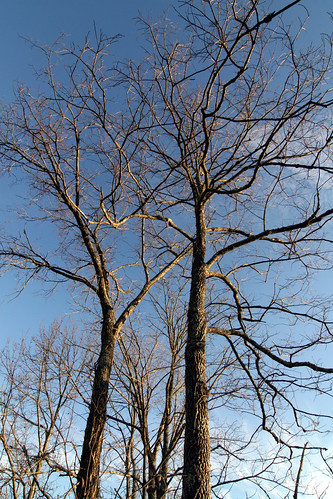
Naked trees against a backdrop of a December blue sky.
(*photo credit)
December 6, 2012 Climate Change under Attack in America
A deliberate effort is being made in all aspects of American
commerce and political action to demean the efforts of the world's climate scientists. This is happening in our country (Inside Climate News, September 10, 2012) but not in other parts of the world. During this past hot and dry summer almost half of Americans thought that climate change was either not occurring or from non-human causes. This doubt is unlike patterns in the rest of the world where human-caused climate change is accepted by large majorities: Asia 83%, Canada 72%, Europe 69%, and Latin America 65%. Why are well-informed Americans so different?
The answer is commercial propaganda of a very perverse sort, one that captures hearts and minds by persistence of its message: climate change data is incomplete and there is chance the scientists might be wrong. The merchants of doubt are continuing similar efforts perpetrated against dangers of smoking that resulted in decades of unregulated profits for Big Tobacco. Today we confront immense commercial forces, namely Big Energy, which wants to fight regulations by capturing conservative legislators. Thus, these doubters are buying time to continue receiving perks associated with fossil fuel (oil, coal, and natural gas) use. They discourage energy efficiency and renewable energy, for these climate-control routes would undermine their status quo position.
These profiteers feed on a media that loves to construct "two sides" to an argument, all the while pretending to remain neutral. In fact, from a scientific viewpoint the case is closed and Big Energy helps continue damaging a wounded Earth that may take millennia to recover from greedy corporate socialistic practices (social costs to the public and private profit to the few).
In this Advent season when we ought to come to grips with radical spiritual insight, we must resurface this American industry-led harassment of U.S.-based climate scientists who are not often political in temperament. While needing to observe signs of the times, we are confronted with an organized effort to denounce scientific evidence showing that climate change has anthropogenic origin. Incidentally, the situation is more serious than stated only five years ago, for merchants of doubt prefer to distract the public to other issues.
Currently we have a fossil fuel problem that is not going away: carbon dioxide emissions are decreasing in this country due to rapid fuel source transfer from coal to natural gas, but methane emissions may be increasing. We say may because the current leaking rates of natural gas from fracking operations could be as high as 4% instead of the expected 2%. This "clean" fuel could accelerate climate change faster than burning coal because released methane is two dozen times more potent than carbon dioxide.
Prayer: Lord, give us the clear insight to see what is
happening to our Earth, and give us courage to challenge doubters.
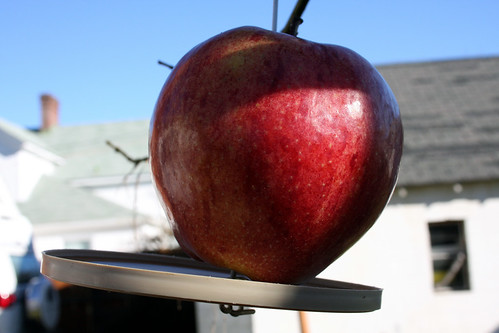
Gift for hungry winter birds.
(*photo credit)
December 7, 2012 Pearl Harbor Could Occur Again
In early December seventy-one years ago, I clearly recall standing at the church lobby with another grade schooler and discussing whether New York City would be attacked next. The thinning ranks of those of us who remember Pearl Harbor, and a dwindling number who were actually at the attack site, can testify to the trauma of going to war in 1941. The awful 9-11, 2001 incident makes it easier to talk about possible surprise attacks.
Cybernetically, such an attack in this computerized age could do immense damage to utilities, transport networks, communication systems, and banking establishments, to name just a few. We would be in a state of chaos and it would take time to recover. Many national safety experts worry and homeland security people focus attention on the possibilities of such an attack and its aftereffects. To some extent cyber warfare may have already started with respect to Iran even though attackers are supposedly hidden from view. Cyber war may be in the offing.
Biologically, some forms of pathogens could be introduced into our food supply and do untold harm. It may be slipped through air, land, or sea routes and go undetected until the first victims appear. Has it already been done? What about spread of Lyme disease affecting so many from tick bites (brought from visiting deer into a guarded government biolab)? Such forms of pathogen escape or intentional introduction are not beyond possibility.
Terroristically, airplanes or other modes of transportation could be destroyed by a competent and secretive "underwear" bomber who sneaks his or her lethal materials aboard and detonates them. We want safeguards that are not intrusive and yet cover an entire cohort of travelers coming to our country from all parts of the world. Such absolute and complete security cannot be ensured or, if attempted too rigidly, would add much to expense and inconvenience to travelers. Many do not appreciate the heavy- handed searching that is required for such thoroughness, but will tolerate it for "other" people. Terrorists recognize their power of surprise that adds suspense to their purpose, widespread publicity, and effective and yet not fully tested deadly methods.
Oligarchically, Pearl Harbor could involve the total takeover of our democratic process by a wealthy contingent of individuals who dictate policy through lobbyists' and donors' demands to those in power in our country. This is a threat of immense and unrealized proportions, and in some way is more subtle and yet just as grave as others mentioned. We can lose our freedom and never even know it happened. In place of a Pearl Harbor event, it could be a time lapse with victims' attention turned to bread and circuses; the attention is removed from what is actually happening.
Prayer: Lord, teach us to be alert, especially during this Advent season, and never to let down our guard. Help us to live
with this condition and still retain our peace of soul.

Paperwhites in the windowsill.
(*photo credit)
December 8, 2012 Immaculate Conception and America's Motivation
Today's is the patronal feast of the United States, and it is also the feast that is more misunderstood than any other in the Church calendar. To some this Feast of the Immaculate Conception deals with the conception of Christ, but that is not the case. We speak of Mary being always free of any stain of sin, in God's preparing her for the coming of Christ. God's singular grace is given to her, and we celebrate that gift in a special way. We can liken the preparation of Mary's physical birth to our being born into the Church through Baptism. Here we extend our reflection to our maturing purification of motivation on our journey of faith.
A pure intention is one that is spiritual in its depths and without individual human material self-satisfaction as a principal motivation. Part of this world's troubles is greedy profit motivation that builds on the human tendency to selfishness. In response we must take the effort to purify our motivation and leave selfishness behind. We are people on a sacred mission and the material aspects are there and must be utilized properly. These could be idolized and so distinction is necessary. Individually we are to become more and more selfless people working with a spiritual community of all believers. Through our being like Christ and sacrificing self we touch the hearts of others and assist them in their faith journey.
It is not the summation of all totally pure motivations that make a change in our world, for such total purity is nearly impossible. What is within reach is the quality of people becoming more motivated to be selfless that gives others inspiration to become selfless in their actions. To the degree that this goal of dignified human struggle is in the forefront our purification of motives will be seen as honesty -- and an immaculately conceived motivation may begin to emerge and gain ground. Strangely, this purification process has a material element -- the essential needs of all people (food, shelter, education, and health), and without these our own work could not be successful.
The spiritual quest for a purified national motive to reach a lofty selfless goal is always accompanied by a concern that includes furnishing essentials to all people. We are not divorced in the spiritual quest from matter, for the Messiah was born into our midst with flesh and blood. He eats, sleeps, and walks about like the rest of us. Through gifts given to Mary we also learn about the wedding of the spiritual and material in the incarnation of the Lord. An authentic and purely motivated spirituality includes material concern for all people and not just ourselves. If America were so motivated, we could be a great nation. Mary's purity is what we seek for our purified nation's goals.
Prayer: Lord, give us as individuals a sense of selfless concern for others and a pure motivation to assist others. Help us as a nation to rise above profit motivation and to assist others
within our land and in the world to address their essential needs.
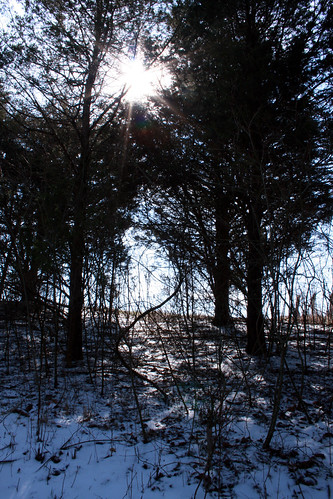
Sun beams through the forest with a blanket of snow.
(*photo credit)
December 9, 2012 Advent: Becoming Forerunners of a Future
A voice cries in the wilderness: Prepare a way for the Lord.
(Luke 3:4)
During this holy season of Advent we look into history and reacquaint ourselves with prophets. We become briefly acquainted with the Old Testament prophet Baruch (5: 1-9), one who remotely prepares the way for the Lord by leveling the barriers that lead to an easily accessible pathway. In the Gospel we observe the proximate forerunner, John the Baptist, a voice in the desert preparing the way of the Lord. He is a transition, a bridge between Old and New Testament. Through discipline he trains in the desert for his mission. When his time comes, he delivers a prophetic word for those who venture to hear him in the desert.
Forerunners are out front exerting themselves in a spiritual sense by preparing the way. This requires the discipline of planning and building a highway, and still more. It takes effort to be forerunners to a future not yet actualized. Ours is the continuation of the path of salvation history with its years of preparation both remote and proximate. As individuals we need to be people capable of focusing on the essential needs of our world. Our future is possibility in which our contribution makes its unique imprint. We want it to benefit all, and with God's grace we help actualize this goal. We cannot act alone; God strengthens our cooperative endeavor with its strong community dimension.
HERE is the place of contention. We are driven by the Spirit to break the silence of inaction, to speak out, and to accompany words with needed change. It is not a distant remote issue but one that is right at hand. Silence as partisanship is our website's message during 2012 both before the election and now beyond. We know that forerunners do not stand back; through consistent training they prepare for the race; through major exertion they run in an attempt to lead the pack. Troubles inspire us to run; preparation moves us to the right action. We cannot mess around and get distracted, for our race is serious work.
The time is NOW. We are called to take responsibility when others are hungry and in need of essentials, food, shelter, etc. One essential sought is human dignity, strengthened when we dignify others by encouraging them to play a vital role. Encouragement may be risky and not designate us as heroes. We are the hidden leaven for fermenting change. The poor will rise and those in high places come down -- and we who are forerunners begin the revolution.
WE must act together. Forerunning is not uniquely an individual exercise, for we are called to prepare roads that take mutual cooperation. Preparing the way is difficult work. We need to suffer with the Lord in order to bring about his glorious Advent. Yes, called to be forerunners, we see this as an opportunity to make a future with others involved in the process.
Prayer: Lord, give us the stamina to be good forerunners.
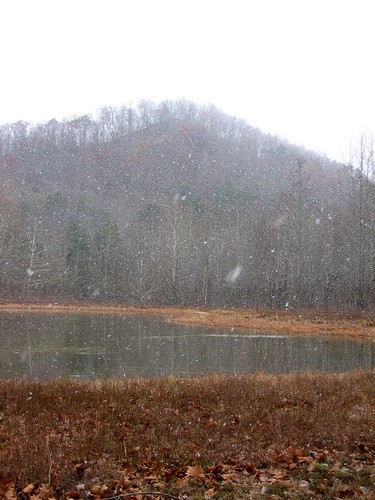
First snowfall in the Mountains. Rowan Co., KY.
(*photo credit)
December 10, 2012 Appalachian Is an Emerging Ethnic Group
Do I know more about our Appalachian people after living my early years and then working for another four decades within the region? Yes and no. After some study and keeping our observational skills honed, we discover that many ancestry traces and cultural traits blend over time. We have in this Appalachian region strong traces of Native Americans, especially those who were not expelled or killed but, rather, who receded into the recesses of the hollows or quietly intermarried with settlers. These added their good qualities to the emerging Appalachian culture.
To this Native American trace is added the strong independence of Celtic Scotch-Irish and the northern English who wanted independence and self-sustainable living as a hallmark of their vision of success. Freedom was a very high price and goal and allowed for stability and clannish ways with its accompanying fierce loyalty. The northern half of our region has an added dose of Germanic character coming from movement directly west from the Atlantic coast in the 19th century. Add to this mining employment opportunities that brought African Americans, Italians, Hungarians, Slavic people, and others to the mountains to add spice to the culture. All these elements have led to an emerging culture that differs from pure strains of ethnicity.
Ethnicity now becomes an Appalachian blend; by definition, this ethnicity is a feeling of belonging to a given culture to which one is proud to identify. Amazingly, many in our region do not understand the Census question about ethnicity and are genuinely puzzled by the limited list for "Appalachian" is not mentioned. They belong to a distinct culture that can be defined by music, dance, choice of words, goals in life, and cuisine. Some of this shows strong Celtic origins and some is new and flavored by the others who came, were welcomed, and integrated into the total regional culture. Most do not know who a Celt is.
More than in any other part of America many Appalachians resort to accepting the definition of being "American," and this in many central Appalachian counties outnumbers the more standard listing of English, Scottish, Scotch-Irish, Irish, and German. In some counties one or other of the named groups will in a period of data- gathering outnumber the "American" component, but not by much. Had there been an entry called "Appalachian" that would have won hands down because ethnicity has this real sense of being so identified. Most of the older ethnically-rooted support institutions have never existed in Appalachia, while strong local and regional cultural groups have emerged as substitutes. Identity comes through acceptance of local ways of doing things and here they are "Appalachian." The Ethnicity of incoming groups was not emphasized except in rare cases such as northern West Virginia or further north. "American" is really "Appalachian."
Prayer: Lord, teach us to love what we have received and to
help improve it through mutual support of cultural connections.

Club mosses add touch of color to December forest floor.
(*photo credit)
December 11, 2012 Ethnic Amalgamation or Ethnic Diversification
Some would note that older ethnic groups melt away or amalgamate over time as discussed in yesterday's reflection. This is why it is all the harder to find the Scottish and Scotch-Irish in our midst even while people with these traces are around but are distant from their roots. As more and more marriages occur and children of mixed ethnicity are the product, it is increasing difficult to identify distant roots. Over time and through increased mobility ethnic diversity weakens. In fact, this is the case in calling oneself simply "American" as popularly found in Kentucky, Tennessee and states immediately to the south and west. In these states specific European origin becomes more unclear.
In our Earthhealing ethnic work over four decades we find an emerging ethnic picture of localities and entire regions in motion. While amalgamation does occur, especially in older 17th and 18th century arriving groups, America has always had a fresh infusion of emerging ethnic groups. However, amalgamation is not the total picture. In this 21st century, large numbers of Asians and Latin American people have come to this country legally or otherwise, and these add diversity in amounts not seen since the great migrations of the late 19th and early 20th centuries. At that last migration, large numbers of southern and eastern Europeans and others from the Middle East came to form the ethnic clusters, communities, and parishes found in industrialized America -- and followed the similar migration patterns that filled rural America a half century before. Over time, rural groups weaken and move on as noted in our Ethnic Atlas series of maps.
Diversity has both declined and increased. Since many of the older groups have lower birth rates than the Latin Americans, we expect minorities to become a new majority through births. At this time, total general population rise through amalgamation is occurring at a slower rate than population rise through diversification. Trends will change and we do not expect that Greek or Italian or Polish clusters will expand to the degree that Hispanic and Asians will, because Greece, Italy, and Poland do not furnish large numbers of immigrants while other lands do. This is certainly the case also of England, Scotland, and Wales as a dwindling source of immigrants. Decline of certain ethnic groups and rise of others makes the case for or against diversification.
Amalgamation occurs through intermarriage and failure of new generations to identify with those of their parents, for as third and further distant generations they have lost their roots. They prefer to forego their last name and make a hyphen with a spouse; they move to a suburb or another city and live in a mixed community of those wishing to be "Americans." But other factors are also happening. The diverse and newly arrived groups are growing in numbers and this deserves quantification.
Prayer: Lord, help us know ourselves and honor our forebears.
Help us solve the puzzles that bother us.

Tall-standing grasses in Washington Co., KY prairie.
(*photo credit)
December 12, 2012 Geothermal Energy: Promising but Troubled
Geothermal energy is essentially renewable, for the greater part is environmentally benign and, once tapped, is dependable and low-cost. America's West has many potential geothermal sites, and it seems the future is rosy, but is it? As of April of this year the U.S. leads the world with 3,187 MW of installed electric capacity from geothermal sources, and the total global figure is 11,224 MW in 24 countries (Iceland gets one-sixth of its electricity from geothermal sources). American geothermal sources are centered in California and other western states. However, since 2008 while other renewable energy sources grew rapidly, U.S. geothermal electrical generation grew only 2.3% annually.
The National Renewable Energy Laboratory reported in August that during 2011 and the first quarter of 2012 two new plants and three expanded ones added 91 MW of new capacity. Reasons given for this slow growth are barriers of initial costs in development and drilling and uncertainty of resource exploration. Many other nations are exploring with feed-in tariffs (FIT) procedures whereas in this country there is a reluctance to do so.
The Earth's heat is utilized for electrical generation from hydrothermal fluids (steam or water) and direct application in residential, industrial and commercial uses, such as greenhouses and fish farms. Highly efficient heat pumps are the popular means of tapping geothermal ground sources. Once drilling and installment of equipment is complete, the heat and hydrothermal fluids are sort of free of charge, as so much of costs are up front and in initial investment. Unfortunately, natural gas fracking is the energy investment of choice today, along with wind and solar to lesser degrees. Today geothermal sources have strong competition.
Improving the American geothermal portion in our energy mix could follow the example of Germany and another dozen countries and experiment with feed-in tariffs. These have included fixed payments for the electricity generated by wind turbines, solar panels and biogas power plants. Germany introduced these renewable support systems in the year 2000 and has reached world leadership in renewables. Germany extends this to geothermal, though beginning from a low starting base; their FIT amount averages 14 cents per kilowatt hour but is adjusted according to when projects are completed, how the technology is used, and the type of technology employed. German plans are ambitious: by 2020 the country is expected to have 625 mw of new geothermal power plants.
Geothermal could become a more sizeable part of the American energy scene, and much depends on selling this excellent energy source to the renewable energy financial community in this country. New ways of financing initial investments may be an answer.
Prayer: Lord, teach us to value safe energy sources at hand, and to make every effort to use those more environmentally benign for the benefit of all our citizens.

Frosty fruits of the coralberry, Symphoricarpos orbiculatus.
(*photo credit)
December 13, 2012 State-by-State Distinctive Ethnic Groups
Alabama Creek
Alaska Aleut, Athapaskan, Tlingit, Eskimo
Arizona Anglo, Hualapai, Navajo, Papago, Mohave, Hopi, Pima
Arkansas Ozark
California Korean, Chinese, Japanese, Cornish, Persian, Cahuilla & Native American, Vietnamese, Oceanic
Colorado Anglo, Ute
Connecticut Ukrainian,
Delaware Nanticoke, Early Dutch
Florida Seminole, Cuban, Haitian, Jewish
Georgia Old English
Hawaii Hawaiian
Idaho Welsh, Coeur d'Alene, Nez Perce, Bannock
Illinois Polish, Lithuanian, Letts, Serbian,
Indiana Swiss. Shawnee, Miami
Iowa Danish, Czech, Dutch, Luxembourg, Sac & Fox
Kansas Germans from Russia, Kickapoos, Potawatomi
Kentucky Central Appalachian
Louisiana Cajun, Acadian, Chitimacha, Houma, Coushatta
Maine Canadian, Passamaquoddy, Penobscot, Micmac
Maryland African American, Piscataway
Massachusetts Irish, Cape Verdeans, Armenian, Wampanoag
Michigan Finnish, Bosnian, Chaldean, Arab, Ottawa
Minnesota Chippewa, Swedish,
Mississippi Delta African American, Choctaw
Missouri Austrian, Northern Ozark
Montana Crow, Blackfeet, Assinboine, Cheyenne, Flathead
Nebraska Winnebago, Omaha, Ponca
Nevada Basque, Paiute, Washoe, Pit River
New Hampshire French Canadian, Scottish
New Jersey Indo-American, Italian, Brazilian
New Mexico Hispanic, Tiwa, Zuni, Keresan, Eastern Apache
New York Greek, Maltese, Turkish, Mohawk, Seneca, Dominican, Albanian, Yiddish, Cayuga, Onondaga, Tuscarora
N. Carolina Moravians, Scotch-Irish, Eastern Cherokee, Lumbee
N. Dakota Norwegians. Gros Ventre, Mandan, Hidatsa,
Ohio Croatian, Slovene, Manx, Hungarian
Oklahoma Western Cherokee, Osage
Oregon Umatilla, Modoc, Klamath, Siletz, Walla Walla
Pennsylvania Amish (PA "Dutch"), Slovak, Ruthenian, early Swedish
Rhode Island Portuguese, Narragansetts
South Carolina Gullah, Huguenot, Catawba; South Dakota Sioux
Tennessee Southern Appalachian
Texas Texmex, Wend, Arab, Celtic, Alabama
Utah English, Mormon, Samoan, Goshute
Vermont French, Yankee English
Virginia Filipino, Salvadoran, Pamunkey, Mattapooni
Washington Makah, Quinault, Salish, Yakima, Puyallup, Spokan
West Virginia Appalachian, Scotch-Irish
Wisconsin German, Belgian, Menominee, Icelander, Oneida
Wyoming Shoshone, Arapaho
Prayer: Help us, Lord, to celebrate our many ethnic groups.
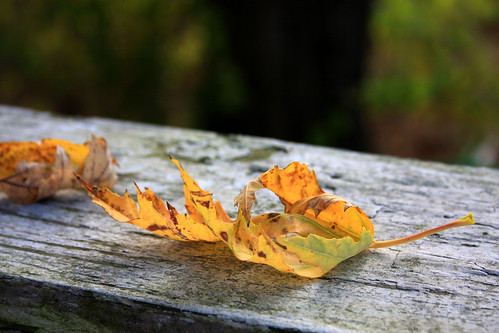
Fall into winter. Maple leaves on weathered farm fence.
(*photo credit)
December 14, 2012 Forefather's Day and Praying for Our Country
This is a preparation for Forefather's Day, a week from today on Winter Solstice. Let's anticipate it with a hope that our memory next week is not too short. We are inheritors of a sacred trust: democracy that is of, by, and for the people. In this age of wealthy American aristocracy we are closer to losing this inheritance than ever before in our history, for much of the financial wealth, media, and legislative bodies of this nation are within the hands of oligarchs who regard themselves as above and beyond the law. Our foremost forefather is God in whom we trust.
Often this year, this website reflects on a serious threat by secularists to remove God from our courts, our motto, our coinage and bills, and in every phase of public life. This secularism seeks to become an established religion that is cast in a sea of proscribed unbelief. Our forefathers would shutter at such a movement, for it is so removed from the values of the American Revolution. We are called to be faithful to their spirit, and if our land is taken over by the wealthy, we must rise once more in defense of democracy.
What does this all mean? We cannot continue the unregulated practice of the many of extreme wealth to send their ill-gotten money to out of reach tax havens, nor should we allow corporations to dictate tax benefits for themselves at the expense of those taxpayers who hurt in paying their fair taxes. We are losing our freedom to elect representatives and to see them into office where they function uncontrolled by billionaires and multimillionaires.
Prayer for Our Country
O my Jesus, you say, "verily I say to you, whatsoever you should ask the Father in My name, He will give it to you." Behold in your name I humbly ask our Heavenly Father to protect every man, woman, and child in our great nation from those who want to delete Your name from our society, i.e., on our money, in our courts, and in our schools. Protect us from plans of destruction from which our enemies have plotted.
You, heavenly Father, are the real foundation of our nation.
I thank you for making me a citizen of this land of freedom and unlimited opportunity, which are the results of its Christian base. Please surround and protect us, and our military with Your love and mercy...in Jesus' name. Amen
Permission granted by --
Dr. Lyn Fontenot
937 Kaliste Saloom Road
Lafayette, LA 70508
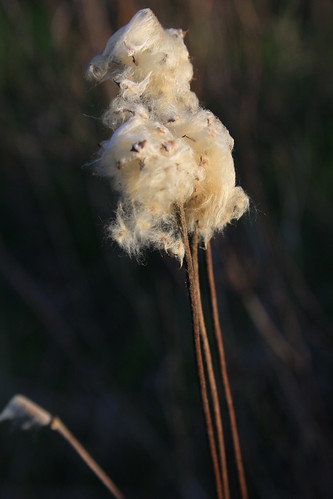
Billowy seeds of the thimbleweed, Anemone virginiana.
(*photo credit)
December 15, 2012 Bill of Rights and Corporate Persons
Corporations are not people. People have hearts, they have kids, they get jobs, they get sick, they cry, they dance. They live, they love, and they die. And that matters, because we don't run this country for corporations, we run it for people.
Senator Elect Elizabeth Warren
The Bill of Rights was a postscript to our long-lasting American Constitution. Those rights found in these first amendments to our Constitution are guarantees to each and every individual person in our nation. So much for the flesh and blood of who we are -- but to extend those rights without duties and responsibilities to corporations --- the work of crafty human hands -- is an abomination. We forsake our Constitution when we idolize corporations and concede powers to their puppeteers who manipulate them. We create false idols when we allow these corporations to roam freely; the multi-nationals ought to be controlled through fair taxation just as required for little stay-at-home fellows.
We know the value of larger and small corporations, the many (actually millions) that are incorporated in our nation. We realize that this very website is one of these incorporated bodies, though a non-profit one. Earth Healing Inc. must keep the rules and it exists within the confines of the law with annual reporting requirements which are dutifully fulfilled. It exists to protect all parties and is to stay in existence as long as it fulfills the informational dissemination purpose of its founding. Then like all mortal concepts it will happily be laid to rest.
Some multinational corporations have grown bigger than life and are subtle proponents of corporate socialism. Under an arena of unregulated globalization they are able to move their resources from nation to nation at will, making Cayman Islands have more corporations (90,000) than people (54,000). The tax havens allow the rich to slip their money out of the reach of legitimate taxation and to bargain for tax holidays when they bring their billions back and reinvest tax-free; then they move their profits back to the tax havens abroad, or rich outsiders bring their fortunes to tax-haven USA. This perversity of justice is explained quite lucidly and in a succinct fashion by Donald L. Barlett and James B. Steele in The Betrayal of the American Dream.
Are we watching the erosion of democracy? Or better put, are we awakening to what has already happened to us with the loss of seven million jobs? There was hardly a whimper as plant after plant went overseas with no deference to the communities in which workers had given their livelihoods and care to keep functioning. It was all for lifeless unregulated corporations with no penalties for tax evasion and outlandish salaries and perks for CEOs.
Prayer: Lord, keep us patient enough to confront theft, courageous enough to challenge it, and powerful enough to preserve
our hard won democracy.
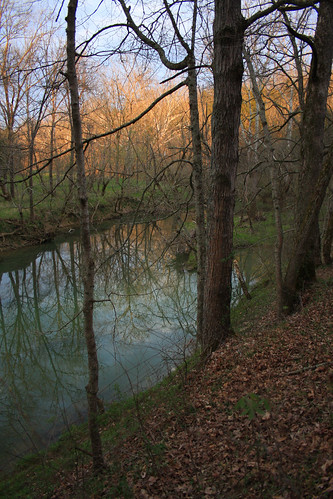
View along Thompson Creek. Mercer Co., KY.
(*photo credit)
December 16, 2012 Advent: The Savior Comes to a Troubled World
The Lord your God is in your midst, a mighty savior.
(Zephaniah 3:17)
The Third Sunday of Advent (Gaudete Sunday) is a time when the constant joy of God's presence in our midst is celebrated. This occurs during a rather somber season when we often are focused on immediate troubles and not on the eventual outcome. As poor people we are overjoyed to find strength in God's presence. Realizing the hope of God with us and that we are with God, and finding a unity of Spirit and goal is what gives us a deep sense of peace and joy during this Advent season. If we believe, we become empowered.
Material satisfaction is transitory. Simply focusing on the troubles and not the outcome is dispiriting and will wear us down. Those who want us to focus on the allurement of materialism would like to keep us in this distracted state. We say "no" to their desire to couple our real poverty with a sense of weakness. On the other hand, an authentic spirituality allows us to confront the insatiable appetite for material things.
We rejoice with the Lord. Thus, a focus on our calling is reason to rejoice as we flee from the materials that can make us lose heart. We rejoice in our liberation (a past event), the gift of inner peace (present condition), and the anticipation of greater things to come (future possibilities). All of these manifest God's promised presence, the coming in time and continued presence, and the future final triumph that will have our mark upon it. Past history and future promise unite in the present moment, and our current participation in the eternal NOW of God.
Victory is before us. Oppression will not triumph even though we experience it in a very real way. Now is a time of jubilation because the present state is not permanent, and we have the power if we believe to change it for the better. We can shake up this status quo which the privileged want to go unquestioned. Their very position totters for it is temporary and unsustainable. Through the eyes of faith we see the limits of crass materialism. We see that changes in global climate are real, can be checked, and the wounds left by wanton human greed can be addressed. God is the savior and as people of faith we are part of God's saving deed.
Jesus, the savior and liberator, initiates a process that is ongoing. We are not bystanders; we are participants in the grand act of liberating this world from those of privilege who do not want us to speak or act. Our inner peace is knowing God's presence and our awareness of it. This energizes us for we do not stop and gaze in the splendor of a beatific vision beyond the horizon. Jesus leads us to liberation, and we are God's liberating arm by acting in a non-violent but forceful manner. We are enthusiastic through it all, for God is with us and we are aware of God's presence.
Prayer: Lord, give us the grace to be upbeat even in troubled times. You are our justice and peace and that is Good News.
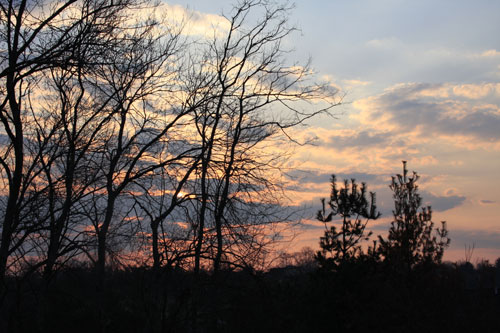
Skyward view in mid-December.
(*photo credit)
December 17, 2012 Made in America and Wright Brothers Day
This title is not an opportunity to practice American chauvinism; rather, the goal is social justice. Our nation has lost seven million jobs to overseas manufacturers since the turn of the century. In our small-town factory area of Appalachia the economy has been devastated and had jobs remained our region would be thriving. Profiteers and captains of industry without consulting the local community decided to move operations to less regulated and lower wage-scale lands. Workers who gave their entire working lives to a company were heartlessly fired.
Why bring up this subject on Wright Brothers Day? Because the American Wright Brothers were instrumental a little over a century ago in achieving what humans had dreamed of for millennia, namely, to fly like a bird. A major survivor in our crippled industrialized economy is the aircraft industry that is also being gradually outsourced to China. When enough expertise, tools, and blueprints have been acquired, the Chinese will start their own competition to Boeing -- and, in fact, they already have launched a lighter aircraft industry that will mushroom quite soon.
Our attention should not be focused on the rise of competition in other lands but rather on preserving our home-grown industries from shoes to steel, from clothing to machine tools, from food processing to aircraft. Some advantages to keeping our industry includes better control over desired quality when homegrown. The energy sources and raw materials are closer at hand and products can be delivered in a dependable manner in shorter time. Skilled people with a sense of self-worth find this characteristic strengthened by job guarantees, especially in periods of middle life when demands on earnings are great. This self-worth extends to entire communities and involves past social capital needed for future community development; this includes academics, worship, retirement and health services, and the political life of people.
In energy areas closer to us, survival and insourcing are starting to occur, even though cheap fracked-natural gas keeps us in the fossil fuel economy. However, cheap gas does enhance a revival of rust-belt, primary-metal manufacturing. Proximity to high quality but higher-priced solar and wind equipment allows American-made goods to be available even though solar energy company bankruptcy has received publicity. Solar panels are still made and sold by Georgia-based Suniva, as are those made by Solarworld, an industry leader in recycling solar panels. A third surviving solar manufacturing company in America is Sharp, which included assembly in this land even though it isn't a U.S. company. Solar racking systems include Unirac and Ironridge. Solar inverters can be obtained from several American firms including Enphase, an industry leader in environmental stewardship. America can aspire to energy independence and renewable energy leadership.
Prayer: Lord, give our people the courage to find pride in producing the equipment we need for a healthy American economy.

An elderly pet does some exoloring, with supervision.
(*photo credit)
December 18, 2012 Caregiving and Institutionalization
One of the most onerous decisions for responsible and concerned people is when loved ones need additional care, beyond what the designated caregiver can provide. The possibility looms for institutionalizing this person. A difficult decision emerges for the family and the more loving the group, the harder it is. Granted, care at home is better when all things are considered, but some unforeseen considerations need review:
* Is the care receiver able to advance beyond total care need?
* Is the home facility up for the task?
* Is the existing caregiver able to perform the work involved?
The person cared for is the primary consideration. Though some who love them immensely would like to be the primary caregiver, this may work for only a certain period of time. However, aging, infirmity, and physical or mental conditions may render the caregiver less able over time. Much depends on whether the person being cared for has a possibility of improvement or is on the normal route to ever greater dependency. Helping someone in their span of semi-independence is one thing; when they are totally dependent and need nursing care, it takes full-time caregiving and it taxes many caregivers almost beyond their means. If this condition degenerates into an impossibility of improvement, then caregiving often reaches heroic dimensions.
Facilities of "home-care" have a good and familiar ring that makes the sick or elderly comfortable. While it is ideally better to be lodged in one's home with loved ones around, that is not always the practical solution. What if the place is relatively isolated and transporting supplies to it is difficult? What if it is not a suitable place due to severe winters or summer heat? What if the vicinity is congested, noisy, insecure, or prone to flood or other natural disasters? What if living accommodations degenerate over time? Homes are wonderful, but for the sick or elderly person they may not be or remain ideal or even serviceable when better-suited alternatives are possible. Private care may not be available given shortages of finances or housing, and a public institution is needed.
Caregivers have their limitations. Some become ill and are unable to handle fully dependent people, for this becomes a 24-7 operation. Such a condition can be mitigated by caregiving assistance in nursing, physical exercise, bathing or house maintenance. However, auxiliary care is often lacking and caregiving limitations may arise unexpectedly. Heroic efforts may simply be too much and so the decision emerges to institutionalize the patient. The ideal order gives way to reality, and acknowledgement is a spiritual and humbling admission that as human beings we have limits. Caregivers may find the task too great.
Prayer: Lord, during this Advent help all to realize that changes in life are needed so that all people can come closer to the Lord. Advent often involves coming to major decisions.

Scene from a carefully-planned meditation garden.
(*photo credit)
December 19, 2012 Constructing a Meditation Garden
At St. Elizabeth of Hungary Church we are turning our surplus lawn into a meditation garden as a service to the worshiping and wider community. Many folks are hard pressed by family difficulties, and wish a private place to pray and do not feel inclined to do this within a church structure. Our parish council has voted that this is a special outreach to our community for it shows that the Church is more than an ornamental building in a community; it is meant for both indoor formal liturgy and its surrounding outdoors is meant also for the glory of God. We hope that this will be an inspiration for others to move from ornamental lawn to prayerful garden. The progress is deliberately slow so that all members can have objections voiced, and so feel invited to participate in some fashion. Some additions to date include:
* Fruit trees were planted early on a few years ago and dedicated to various donating families. These include mulberry, peach, nectarine, pear, cherry, apple, plum, and pecans. The fruit-bearing record to date has been spotty.
* Garden space for growing vegetables along with rain barrels and raised beds have been constructed and used for a number of years along with an exterior compost bin;
* A hard-to-mow steep hillside is planted in blueberries that are healthy and starting to bear fruit;
* Certain flowers are being transplanted to portions of the garden with many more expected in the coming years;
* A reflection pool has been constructed approximately one-a-half foot deep so as not to be a danger for young intruders. The bottom is covered with a buried pool liner after sandwiching it with layers of felt. The material taken from the pool space was used to bank the sides;
* A rainwater downspout from the nearby rectory is directed to the pool and this is being stocked with year-round fish to eat the mosquito larvae, and with a water disturbing instrument; and
* Paths of wood chips are being established leading from entrance to pool.
Work-in-Progress
We are planning to lay flat rocks as paving for a meeting section so that people could have group prayers near the pool. Rustic benches are being planned along with a solar pump to circulate the pool water on sunny days. We also will be adding herbs and flowers as well as bushes, and yet the areas are left somewhat unplanned for spontaneous additions to maximize the freedom of donors. Outside the church entrance are flowers that bloomed year-round in 2012 -- and we hope weather permits this to continue. The hillside above the Church is forested area and now terraces of flowers are being added as partial understory. At the side of the church is a flower area with the statue of St. Fiacre, patron of gardeners, as a center piece. Other statues and artifacts may be added as time and inspiration directs.
Prayer: Lord, help us as a community of faith to create sacred space, and to invite all who desire to come and meditate.

Noticing a small, but tenacious member of the forest community.
(*photo credit)
December 20, 2012 Sacagawea and Her Contribution to America
Sacagawea was a humble Native American woman who died two hundred years ago today and played a vital role in the settlement of our nation. Sacagawea embodies all the nobility of her people for she helped in simple but important ways, as guide and spouse of the interpreter of the historic Lewis & Clark expedition. It was that official exploration in 1803-5 that solidified our nation with the first formal understanding of the vast Northwestern territory from the Dakotas to the Pacific Ocean.
Sacagawea was born in present-day Idaho, a member of the Shoshone nation; she was kidnapped at an early age by the Hidatsa and brought to their settlement in present-day North Dakota. At age thirteen she became the wife of a Quebec trapper, Toussaint Charbonneau, and was pregnant when the Expedition arrived and employed her husband as interpreter -- in part because they heard that his wife spoke Shoshone. During the travels, Sacagawea through her quick reflexes rescued Clark's journals and artifacts during a river spill and thus the Sacagawea River was named in her honor. She was overjoyed when reaching her native territory and her reunion with relatives. At that point the expedition discovered to the fortune of all that the chief of the resident tribe was her blood brother, Cameahwait who transferred horses and supplies for the remainder of the expedition.
Sacagawea gave further valuable assistance during the thousands of miles, once by recommending a route through what is Gibbons Pass in Montana and then later the location of Bozeman Pass, each of which she recalled from early travels. Clark regarded Sacagawea's greatest contribution to be her presence when passing through hostile tribal territory. These tribes were never accompanied by women when engaging as war parties. She and her family unit became a sign of the expedition's peaceful intentions, a fact that Clark acknowledged was more valuable than words.
Clark was so fond of Sacagawea's son that he regarded him as his own and so he wanted him to receive a formal education. In fact, the family did move to St. Louis in 1809 where Clark was an official. Sacagawea died unexpectedly at an early age of 24 in 1812 but her burial place is a matter of dispute. Her son, Jean Baptiste Charbonneau, and infant daughter Lizette, were left without a mother. In 1813, the boy was signed over by his father to the special care of Clark, and the boy was educated at the Jesuit school in St. Louis. He proved a restless soul and became a miner and died during one of the mid-century gold rushes. It is noted that Sacagawea and her son have their features on an American one-dollar coin, and a number of monuments and statues have been erected in her memory including one at the North Dakota state capitol. While not totally appreciated in her life (see December 18, 2009), a grateful nation has responded in later years.
Prayer: Lord, help us to appreciate the noble contributions of humble people who enter our lives, and may their souls be at peace.
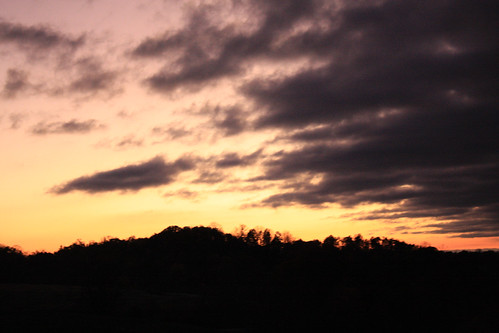
Waiting for a long, winter night.
(*photo credit)
December 21, 2012 Now Winter Is Here; Where Are We?
Today is Winter Solstice and we are called to action. Of all the seasons this one of hibernation tempts us to hunker down to endure ice and snow. However, that is not really the best way to view the season. With Christmas coming next Tuesday, we have programs to prepare, gifts to wrap, and visits to make. It is not a sleepy weekend ahead of us, nor ought it to be. Now is when we must pull together and help each other. Kids may see winter as a time for special outdoor excitement with new-fallen snow, still for many it is the time of treacherous streets, icy pathways and steps, and sharp winds. For us, winter invites challenges.
Look after others. Unexpected storms bring stranded travelers and people ill-prepared with limited supplies. It may mean opening our doors to some folks who are far from home, or to give them food or gas money. Sick and elderly neighbors may need refills on medications or special errands run; others who are less mobile may need a ride or a trip for groceries.
Look for opportunities. Often the snow needs to be cleared from doorways and sidewalks, and early risers may be the first to clear the snow from cars and driveways. During the day, the number of opportunities to assist others actually mounts. Most often the phones and electronic devices are functioning, and so it is good to check up on more distant loved ones.
Look into supplies. Sleet storms are possible in large portions of our country. These can be exceedingly crippling, for downed electric lines mean blackouts that can last for a period of time. Preparation for such possible events includes candles, flashlights and fresh batteries, crash blankets, canned food and water supplies, and even power generators. Everyone should be set for the basics for a two-week stint if sleet comes their way.
Look out for birds. Don't forget that winters are hard on wildlife that do not migrate. Keep bird feeders supplied, for permanent residents have a hard time, especially with prolonged snow cover. Keep wildlife needs on the winter list.
Look over winter requirements. It takes extra time to see that all is in order for food, water and fuel supply. A final check on insulation and covering certain windows and closing off unused living space is important. Must we add: save fuel, dress warmly, and prepare for the colder times ahead?
Look for reading materials. Winter can be a good catch-up time for the reading we have put off over the active summer season. It makes the bad weather a little milder.
Prayer: Lord, we all too often prepare for what is immediately before us such as the Christmas event, and still overlook the possibility of unexpected winter events ahead. Give us the foresight to plan well and make this a successful winter.

Portrait of donkey.
(*Photo by Shean Donovan, Creative Commons)
December 22, 2012 Gus and the First Christmas
I was born on a farm and came to like Christmas quite early because it was a change in the rhythm of work. It struck me early that animals like Christmas just as much as we do. We forget that animals have a great part to play in the early life of Christ.
A Children's Story
Sheep were in Bethlehem's fields, oxen in the stable, and doves ready to be sold for a child's presentation. Oh yes, the donkey had a place as well. History shows us that one such beast of burden was named "Gus," in honor of the current Caesar Augustus. Some even said this donkey was one of the dumbest of the class of animals called "stupid." He was the laughing stock of Nazareth. His price fell because the owner said he wouldn't amount to anything. The kids said he could not even kick or pull a cart or do farm work. All he could do was wiggle his ears, but he was sort of proud of that, if Gus had anything to be proud about.
Joseph having been engaged to Mary was anxious to have a means of travel for her when she went on journeys. As a lower-income worker, Joseph kept an eye out for reasonably-priced beasts of burden, and so the asking price for Gus was just right. If children would come at least Gus wouldn't kick or hurt them if they came too close. The angel Gabriel came to Mary and she said "yes" and thus become the mother of the Lord. She had to hurry off to visit her cousin Elizabeth who was ready to give birth to John the Baptist and Gus had the task of transporting her. He did what he had done to the local kids a thousand times before and wiggled his ears at every opportunity, but she seemed to be caught up in other thoughts and so he simply trudged along. Well after a long visit and rest Gus brought her back to Nazareth; Mary was greeted by Joseph who asked about the kinfolks, travel conditions, and how well Gus performed. In a short time Joseph informed Mary they had to conform to a census decree from Emperor Augustus, and they must return to native Bethlehem, for he was of the House of David.
Gus was especially careful since Mary was expecting a child in a very short time. However, there was no room for Mary and Joseph at the inn. And so the three of them --Mary, Joseph and Gus had to go and spend the night in a stable. The Christ child was born and placed in a manger of hay-- not straw, which is bedding. Gus noticed the little child in the manger and he did not eat for fear of disturbing the bed of hay on which the child rested. He breathed more heavily because his warm breath would kill the chill. Gus noticed the child look up and open his eyes. Here was an audience as with kids in Nazareth. Gus wiggled his ears -- and infant Jesus smiled. It wasn't gold or frankincense, nor the little shepherd with a kid, or the little drummer, for that would all come later. The first of the gifts to the new-born king was given by Gus the Donkey, an adopted member of the Holy Family.
Prayer: Lord, show us when to bring on a smile at Christmas.
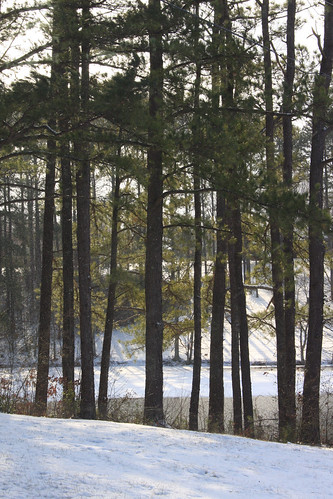
December snow through the pines.
(*photo credit)
December 23, 2012 Advent: Sacred Moments of Expecting Parents
This is not written from first-hand experience but as an observer at births of siblings, as well as of offspring of others. The birthing experience appears to be a consuming one with dangers, timing, questions about assisting personnel, and even possible need of emergency equipment. Every hour on this planet over ten thousand births occur, but let us flash back to a particular one on that first Christmas -- and the situation of those poor and ill-equipped travelers without proper lodging.
Mary has gone through a trauma in being with child and yet of unknown father to some -- an event, had it been known, in the strict local circumstances could have been punishable by ostracizing or more. She had a secret with the Lord and she still showed magnanimous gratitude in what God had done for her. Amid this vast uncertainty of an expected birth she traveled with Joseph to the census gathering in which he was required to go to his native place of Bethlehem. But as the journey took them closer to this town, the frightful reality of an upcoming birth and no room because of crowded conditions stuck her in a special way as mother-to-be, a first time at that. What went through her mind?
Joseph was the watchful foster-father to be, and severe trepidation confronted him as well. He was inspired to take Mary as his wife even though the great mystery of what happened eluded him. What Mary had in trust of divine protection was also in some degree shared with Joseph. As protector, he had to find their way to a safe and secure lodging and with possible assistance from a kind and skilled midwife. Then reality set in after this tiresome journey -- there was no inn available to these humble folk. The only shelter was a stable in the vicinity, amid the livestock within the cave. This was the best, and certainly humbling enough for this poor couple.
As we contemplate the preparations for that first Christmas our minds turn to the on-going birthing of millions since last Christmas, and wonder about pregnant women who are refugees, and also of those who are in such modest circumstances that they are unaware of next year's food and clothing for their offspring. We pray for those who have had troubles leading up to birth, those whose partners have abandoned them in this time of need, and those who are starting a single-parent family. Our hearts go out to all such concerns in our troubled world, and we hope that caregivers will be available and generous during impending moments of need. As a new year approaches, let us hope that health facilities are expanded in our land and world to handle the many emergencies that will arise. Let's pray that newcomers in this world will be able to survive and reach a higher quality of life needed for their own growth and contribution to a needy world.
Prayer: Lord, look kindly on all expectant mothers and fathers and on their offspring that a promise of survival is fulfilled.

The Christmas fern, Polystichum acrostichoides.
(*photo credit)
December 24, 2012 Spread the Pure Joy of Christmas
Christmas joy to you! This is our basic message to many faithful readers and viewers. In many ways millions of cards and messages express this joyful sentiment as we try to spread that sense of bliss and happiness to others. Let it be a way to comfort those who have had tragedies in the past year and desire that for a brief moment they can find peace that the Christ child brings to our troubled world.
Joy is in children's delight. Little children stand at this supreme moment amid their songs and skits before the crib with memories of great expectancy coming to fulfillment. For some, it is the few additions to their lives of material want; for others it is a prayer that good things will come about and loved ones return and be present; for still others it is a sense of satisfaction that they have shared a little of what they have with those with less.
Joy is in the Liturgy of this night. In our parish we conclude our post communion period by the tradition of turning down the church lighting, and each holding a lighted candle and singing "Silent Night." Here we enter the mentality of children who have waited so long, who expect good things, and who await the coming of Christ in a special way. At one blessed moment when the troubled world pauses, we feel the wintery darkness outside and yet we discover the softness of a coming light that will brighten the world in the coming months.
Joy is found in growing light. We are told that the original pagan feast occurred when supposedly the increasing autumn darkness of each passing day would not end, but rather the world might be cast into total darkness. When the first signs of lengthening day light occurred, there was great celebration. Believers also came to realize that the darkness of sin has not conquered; light is returning and days are getting longer. The soft and gentle light of the candle foreshadows new brightness to come in the near and distant future. Darkness does not conquer; we have eternal light; the Prince of Light is here.
Joy deserves its brief unfettered moment. With this sense of hope we return to the pure joy of this evening. While those who suffer call for our attention and rightly so, let us not abandon them but look inside our hearts and discover a peace of soul that is not disturbed by darkness all around us. For one brief moment, let us celebrate this peace within us at this time of sacred communion with the Lord who comes to us amid our difficulties. His coming in a stable and amid uncertainties of homeless parents is a blessed time when time stands still with the sacred NOW of God's presence: angelic choirs sing, shepherds adore, and even the animals around give a sense of solemnity to this monumental event.
Prayer: Lord, you come as promised to a world of unfinished business, but you ask us to rejoice at your coming into the world.
Give us the simple joy of that first Christmas.

Glistening of a vintage "tinsel" tree.
(*photo credit)
December 25, 2012 Christmas and Manchester Prisoners
The blessings of Christmas to all readers and to those who are confined in circumstances wherein they are immobile.
My heart goes out every frosty Christmas morn for the many who are unable to share this blessed event with their families and loved ones. At this happy season, no group in America means more than the three million Americans behind bars, for these deserve our prayers and well wishes amid their confinement. Amazingly, their very locations show a more cheerful atmosphere on the outside than what they can see and experience within. I have tried to depict this in our book that is forthcoming next year, Appalachian Sensations: A Journey through the Seasons with Warren and Pat Brunner. This December excerpt is from that book:
December -- Glistening Razor Fence at Manchester Prison
The spirit of the Lord
YHWH has been given to me,
for YHWH has anointed me,
sending me to bring good news to the poor,
to bind up hearts that are broken;
to proclaim liberty to captives,
freedom to those in prison.
(Isaiah 61:1)
For one brief moment the Manchester Corrections Institution seems like a giant Christmas display set amid Appalachian hills. On closer inspection one finds razor wire, guard posts, and a vast prison complex. When lights illuminate the place on wintry nights, the place sparkles like shrubs with a million Christmas lights. But behind the glittering wire, a thousand unfortunate prisoners are outcasts to a fearful culture. Some keep their offense a secret; others regret lost time and uncertain futures that await an ex-felon's life; still others feel the hurt of suffering family members. They are all part of Appalachia's prison growth industry, victims of America's singular war on crime with few programs for rehabilitation, for there's still much to learn from others, even primitive cultures. Could we not liberate prisoners by finding better methods of public service and restoring them to society than razor wire sparkling at Christmas time?
Prayer: Lord, allow your coming into the world to be a special event for those who are unable to celebrate it through duty, confinement, or distance from loved ones for any reason. Give them the warmth and blessing that only you can provide.
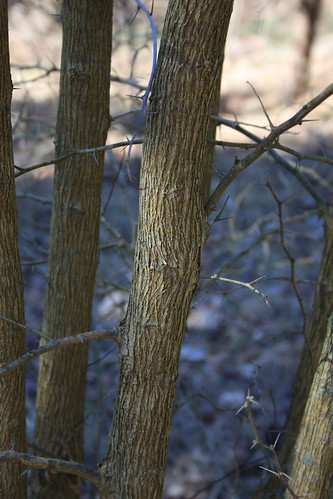
Thorns of the osage-orange, Maclura pomifera.
(*photo credit)
December 26, 2012 Pejorative & Anti-Catholic English Words
On the feast of St. Stephen, the first martyr, we recall times of persecution and a history where some are embarrassed by what others say to them. A number of English words, especially stemming from 17th and 18th century times of persecution, are offensive to Catholics who know their origins and intent. These vary in degree of bias and some bear a misunderstanding as to origin on the part of users. Here are six of a number of examples:
Propaganda is perhaps the most definite Catholic ascribed derivative. In using a capital letter, Propaganda refers to the Roman Curia that was formerly named in the 17th century the Congregatio de Propaganda Fide. This church office was given the care of missionary functions. In this evolution of a biased meaning, the word came to mean ideas, facts, or allegations spread deliberately to further one's cause or to damage an opposing cause.
Pontifical is used to refer to the pope in his functions of office. Actually in its root meaning the word means a bridge (pons) builder (facio), or one who brings opponents together.
It is used in a biased fashion to mean haughty or arrogant.
Indulgence has many meanings including granting liberties by English kings Charles II and James II to dissenters and Catholics. Today the principal meaning is "giving way to one's desires." In church terminology it means satisfying conditions for temporal punishment (correcting disorder resulting from misdeeds) after sin is forgiven. A misunderstanding of indulgence in environmental circles include comparing cap-and-trade practices with allowing "one to sin," or a misunderstanding of medieval church practice. A correct understanding of indulgence is responsibility to make restitution for "environmental" damage done by individuals or by culprits. Actually, ecological and theological goals are allied.
Dogmatic refers to the section of theology that studies the Church's dogmas dating back to the very early Councils of the Church through the centuries. In its biased sense, dogmatic means speaking in a definitive or arrogant manner without proof.
Jesuitical is stated in the dictionary as a hostile term meaning a crafty schemer, cunning, or dissemble, and is used by anti-Jesuits. English people in the 17th and 18th century called people unrelated to Jesuits by that name to show disdain. Blaise Pascal, mathematician and Jansenist sympathizer, spoke harshly of Jesuits in Lettres provinciales (1656-57) as to laxity in moral teachings that he regarded as official church positions.
Hocus Pocus is a magician's incantation when performing a trick and is attributed to the priest's words at consecration during the Mass from Latin Hoc est corpus meum (This is My Body).
Prayer: Lord, may all acquire a sensitivity to use words in
non-offensive ways, and to respect those who are offended.
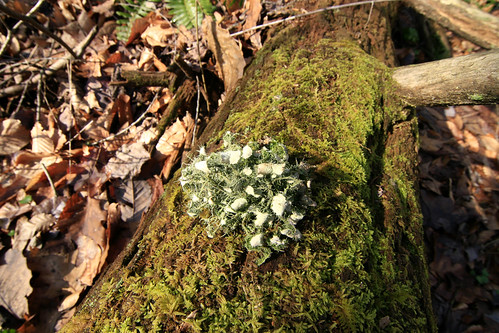
Mosses and lichens.
(*photo credit)
December 27, 2012 How Much Should We Plan for 2013?
Can anything new be said in these reflections about planning? Hardly, except that 2013 is new. The old involve stock planning hints; the new is a New Year with its fresh challenges and promises. The simple fact is that every New Year finds planners reviewing life, and stock suggestions are not quite a propos. We approach this year with persistent economic woes and no easy solutions, with wars and struggles of a serious nature that were different a year ago, of being wiser after a bitter election campaign, and with climate change threatening with even greater seriousness than surmised last December. We may be a little wiser, but planning is no easier. Here are hints for 2013:
Review last year's plan. See how well the 2012's plans were kept or even remembered. The track record for this year may be a clue as to how much ought to be attempted next year. Some say that with experience old plans seem simplistic or useless, and so the rationale for such an undertaking is questioned. Should I plan?
Honesty allows us to plan in a light-hearted manner.
Plan something upbeat. We do not have to make dire plans or those so abbreviated that they are meaningless. In fact, be brave, and plan for bigger things, the Lord willing. Plans joined with prayers can have an upbeat tone, for God answers our prayers.
Don't over-plan. The thin line between under-planning and over-planning is often hard to determine. This is especially true of people who remember past plans that went awry and times when no plans were made that proved full of achievements. Plans allow us to be future directed, and to refrain from walking backward in history. On the other hand, over-detailed plans are stifling.
Make some longer-range plans. The temptation is to spell out details for a short period. Rather, more time ought to be given in determining whether a longer range plan is really the issue worth focusing on this coming year. Give the pluses and minuses of the subject being accepted as the 2013 master plan. Central planners in former USSR (the precursor to Russia today) or China have always had their five-year plans and prided themselves on reaching or exceeding these materialistic goals. America doesn't undertake such centralized planning practices -- but maybe it ought to.
Accept a degree of uncertainty as part of life. Much depends on God plans for us and less on our rigid desire to plan out and have control of our journey. While we make plans so that we can set the course of our direction, God may have more in store than what we imagine. The difference may make us chuckle next year. Any private planning must end with a simple prayer that God is really in charge. In fact, this uncertainty grows with time, but we simple folks still make our plans and God is still in charge.
Prayer: Guide me, Lord, not to foresee your plans, but to simply plan ahead in order to try to use the gift of time well.
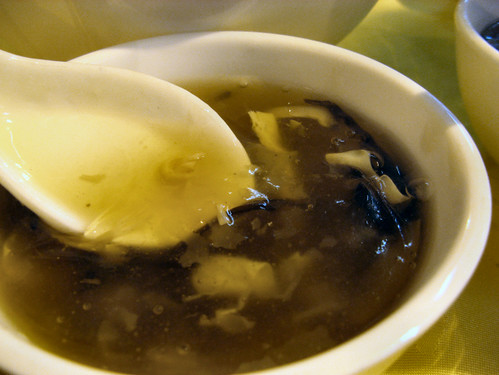
Soup of assorted mushrooms, black fungus and beancurd.
(*Photo by Soon Koon, Creative Commons)
December 28, 2012 Create A Novel Soup Today
The year is ending so let's be creative and do so in the kitchen. Godliness means participating in the divine work of making something anew or for that matter dreaming up something that has never been tasted before. For those of us who do not like to be bound by recipes, we seek to find the powers given to us so as to embellish the breath of creation, not reduplicate it. We can stand by a waterfall and experience divine power; we can sit at a sunset and experience beauty; or we can create or retell a special short story. Try entering the kitchen as a source of inspiration.
Creative power of soupmaking. We are able to take the materials at hand and turn them into something tasty if we put our imagination and spice shelf to work. Virtually every soup created from scratch tastes a little different, and each can taste delightful if we put our heart and soul to the task. We have to think creatively, especially with foods left over after the Christmas rush.
Public power of soupmaking. We can play games or watch TV or go shopping, or we can energize ourselves and other hungry mouths with soup, a novel soup. To make a soup commits us to the judgment of special people who may be invited to partake of our creation, or in a more effective way, to muster the courage to make their own soup from scratch.
Economy of soupmaking. We save money by refraining from purchase of commercial canned soup that has too much salt and too much cooked-out nutrition. The leftovers in the refrigerator from the festivities are inviting themselves to become a new creation -- and the taste has never before been conceived at such a low price. Conservative measures are incentives for creating novel soups.
Hidden power of homemade soup. A nutrition-filled soup can be a wonderful stimulus for us on cold days, and so the warmth and vitamin-filled liquid gives us new vitality. The hidden power to fix a new soup translates into energy to do other creative acts as well. We can end the year on a good note and prepare with a zing for the coming calendar and wonder what it will bring.
Resolving power of soup. Preparing for New Year's resolutions is tricky, for too many get lost in a short while. We always try too much and then have regrets when the concept lapses into irresolution. Making soup is different, for we always get hungry, we need a fast response with little effort, we desire food economy, and we must endure winter's ravages. Soup is the answer, for it defies canned tastes and recipes that are the marks of a concert performer. Rather, we improvise, and our soup is the jazz of foods, something that expresses our freedom and determination to have quality without imitating others.
Prayer: Lord, teach us to see that in becoming confident soupmakers we may gain the courage to reclaim our stolen commons.
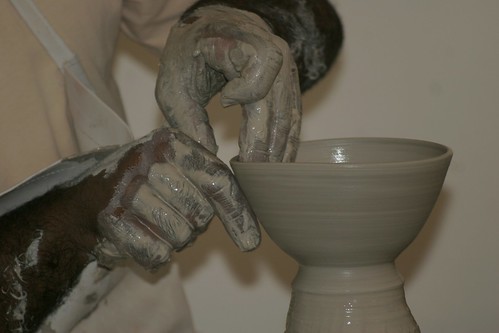
Potter's hands.
(*Photo by Anduze, Creative Commons)
December 29, 2012 God Is the Eternal Potter; We Are the Clay
Take a potter, now, laboriously working the soft earth,
shaping all sorts of things for us to use.
Out of the same clay, even so, one models
vessels intended for clean purposes
and the contrary sort, all alike;
but which of these two uses each will have
is for the selfsame potter to decide.
(Wisdom 15:7)
Potters teach us much about how to craft the formless clay into something useful (see January 27, 2007). This reflection is also appearing under the November section on "touch or feelings" in our upcoming digital book entitled Appalachian Sensations: A Journey through the Seasons. We reflect a little deeper and discover that a craft person's creativity is God-given and that craft gifts are a foreshadowing of God's creative power working in our world. We are allowed at given times and in somewhat subtle ways to partake in the divine act of creation.
We are clay. As we prepare for a new calendar year, we realize that the life we will live next year is currently formless, waiting to happen. We open ourselves to allow the Lord to work in and through us. Our hearts can be molded, and the more we open ourselves to God's working within us, the more we can come to reflect the divine creative power by which we become empowered to act in a Godly manner. By willingly being molded, we become a shiny image of God to all the world. God gives us all as gifts: time, energy, and an unmolded heart. We sculpt who we can and must become using God's gifts to do so. But we are free to refuse. Life was freely given and all time is owned by God and so when this mortal period ends we need to affirm "Amen." For this final utterance we make our preparation and hope 2013 is a success. From dust and into dust is that mortal span, and grace is the moisture in which we mold the dust into a loving act.
We are also potters. Not every one of us has the artistic skill and inspiration to fashion something out of physical clay of whatever color and texture. We can, however, assist the Lord in the fashioning process, helping to put finishing touches on the molding of a formless world around us so that God's imprint will show most tellingly. By molding our hearts, we learn to be sculptors of a future in which we as inspired by the Spirit are part. We freely invite the Lord to work within us, for God is not forceful when it comes to our acting in freedom. We must take grace given and mold a gentle, warm, loving, open heart willing to be attentive and to serve the needs of others. And God is there.
Prayer: Lord, the year 2012 with all its sound and fury comes to an end and we thank you for allowing us to see it through and retain our equanimity and hope. We see you as master potter and ourselves as clay. Help us to be molded into new persons able to see the coming year afresh and willing to spread Good News.
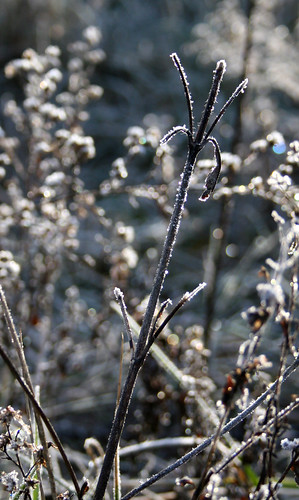
A frosty morning scene.
(*photo credit)
December 30, 2012 Struggling Families: Parents and Children
And Jesus advanced in age and favor.... (Luke 2:52)
Today's Gospel reading deals with the one recorded incident in the 90% of Jesus' life on earth -- from infancy to initial ministry -- that goes mostly unrecorded. This story of being lost at the Temple never fails to surprise us as to its content and the interaction of parents with child. In one sense, it is an ordinary event in growing up; on the other hand this is an extraordinary event in an extraordinary family with a rare happening. Youth and teens grow and sometimes worrying incidents occur, especially when children begin seeing their futures beyond confines of home life.
Jesus is finding himself; he has the strength and energy to catch up with his slow-moving family unit as they return to Nazareth from Jerusalem, and so he lingers behind at the Temple. He wants to engage with scholars of the law, listen, ask questions, and offer answers. Jesus is a bright young person on a steep learning curve, an advancement that he finds needed for the ministry that is awaiting him. He seeks out, finds, and engages in social interaction. And he is drawn by the Spirit in what he does.
His parents are immersed in that slow-moving family unit containing young kids and elders. Mary and Joseph discover that Jesus is missing, and this obviously causes them consternation for nothing like this has happened to him before. At twelve, Jesus is coming of age, but what does this mean for him and for them? Parents know youth need space to mature and expand their social circles. Like all youth, Jesus needs space to grow. Basic humanity is showing itself, and this comes more shocking for parents at times than for youth. Parents find obedient children doing things that were neither commanded nor forbad, actions they decide to undertake on their own. Mystery unfolds where least expected. Mary ponders this event in her heart.
Parents and children grow and even mature at the same time. Every human being is a free agent before God. Each must plot out the pathways ahead and hopefully stay on the right path. A parent points the way, teaches and prays and leads, but individual youngsters must do the rest themselves. Freedom in choosing our life journey is an awesome task, and it takes individual experience that is gathered over time. We come to know who we are with others' help, but we are speaking of an individual creation within the confines of our heart. God gives each human being space to mature. Awesome, yes, and how Jesus responds is all the more awesome. Mary ponders Jesus' freedom as part of her reflection.
When each of us do good things we form our hearts to give glory to God. We respond to grace and that is awesome; when we encourage others to find space and respond freely that is all the more awesome. Parents and teachers hold this privileged position.
Prayer: Lord, help us be or to help others be good parents.
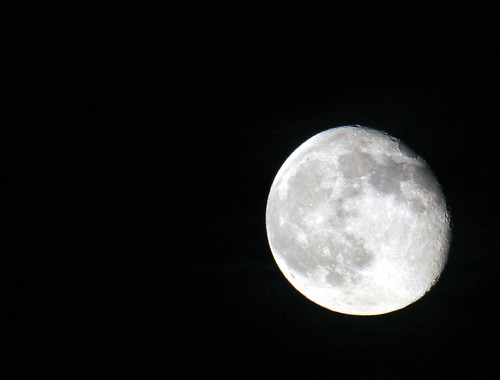
A winter moon, crystal clear.
(*photo credit)
December 31, 2012 Count Your 2012 Blessings
Every year is different, and we ought to have become wiser as this year draws to a close. This first draft was written in early autumn long before this monumental year was completed. Amid the storms of this watershed year we thank God to be called to be present and try to do what we can. We are blessed in many ways:
* Faith and gratitude to be called to take part in the immense work ahead that is opening before our eyes and that we help bring about the Reign of God here on Earth;
* Physical and mental stamina to address and confront the many challenges facing our land and world from revolution to terror threats, from lack of distribution of wealth to addressing the continued and unabated climate change threats;
* Food in sufficient amounts even amid the drought in many sections of our vast land, but we also witnessed food price rises and are aware of this hardship in many parts of the world;
* Medicines in sufficient quantity and quality to treat many of the ailments that afflict our people, but these must be curbed and advertisements suppressed so that the drug culture of our country will be addressed properly;
* Housing in abundance to meet the needs of people in our land to keep them safe and secure, but far too many are foreclosed, under water, and awaiting completion in construction. Adequate and affordable housing is a blessing and an incomplete work;
* Roadways and all means of travel by land, sea, and air, that permit the safe and convenient mobility of population, even though infrastructure needs enhancement in the coming years to the tune of several trillion dollars;
* Internet and dependable postal and phone services to help us keep connected to loved ones and to share information with others. However, high speed services and economic prices are denied many in our land due to excessive profits for communications networks;
* Educational facilities to allow our people to grow in understanding through access to proper information and literacy training needed in our complex society. However, many schools with rising tuition are outside the price range of the poor;
* Security through police and military forces which are needed and yet must be reviewed when our resources are limited; and
* Support communities in Church and local civil society that pull together in times of emergency. This spontaneous show of generosity is meant to counter restrictions on freedom of religion.
Prayer: Lord, give us perseverance to carry on in 2013. |
                                
                               
                               
                               
                               
                               
                               
                               
                               
                               
                               
                               
                               
                               
                               
                               
                               
                               
                               
                               
                               
                               
                               
                               
                               
                               
                               
                               
                               
                               
                               
                               
                               
                               
                               
                               
                               
                               
                               
                               
                               
                               
                               
                               
                               
                               
                               
                               
                               
|